No spy balloons over Taiwan, defense ministry says
Taiwan’s Ministry of National Defense has dismissed concerns about China flying spy balloons over the island while the U.S. said it has recovered “significant debris” from the balloon that was taken down off the coast of South Carolina.
The U.S. Northern Command said in the latest statement that its crews have been able to recover “all of the priority sensor and electronics pieces identified as well as large sections of the structure” of the balloon.
These key sensors will now be analyzed by specialists to determine the device’s surveillance capabilities.
On Monday, White House national security spokesman John Kirby told media that U.S. authorities “were able to determine that China has a high-altitude balloon program for intelligence collection that"s connected to the People"s Liberation Army.”
“"We know that these surveillance balloons have crossed over dozens of countries on multiple continents around the world, including some of our closest allies and partners," he added.
![]() Copies of the Chinese Daily News newspaper showcase pictures of the Chinese balloon, in the Chinatown district of Los Angeles, Feb. 5, 2023. Credit: AP Photo/Damian Dovarganes
Copies of the Chinese Daily News newspaper showcase pictures of the Chinese balloon, in the Chinatown district of Los Angeles, Feb. 5, 2023. Credit: AP Photo/Damian Dovarganes
Taiwan’s military on Tuesday said that so far all Chinese balloons detected in Taiwan’s airspace have been weather balloons and not threatening to national security.
Maj. Gen. Huang Wen-chi, Assistant Deputy Chief at the General Staff for Intelligence, told a press briefing that the number of detected balloons from China now "are in accordance with the number of weather balloons it sends each year."
“These balloons are small in size and light in weight. They will burst automatically when flying to a certain altitude,” Huang said.
Taiwan’s military has the same procedure of handling airborne security threats as the U.S. military, he said, and would shoot down any balloon that poses a serious threat but so far there has been no need.
Taiwanese officials said that four batches of Chinese balloons were detected flying over northern Taiwan in February 2022 but all four were likely to be meteorological or scientific.
China’s balloon program
“Taiwan has enough experience in dealing with threats from China,” said Shen Ming-shih, acting deputy chief executive officer at Taiwan’s Institute for National Defense and Security Research, a government think-tank.
The Taiwanese Air Force has been monitoring its airspace closely and would react to any sign of security breach, Shen said.
The military expert added that the Chinese rocket force has a high-altitude balloon unit that conducts regular monthly training.
“Those training missions do not necessarily target Taiwan but the balloons may traverse the island’s vicinity,” Shen told RFA.
![]() The suspected Chinese spy balloon drifts to the ocean after being shot down off the coast in Surfside Beach, South Carolina, U.S. Feb. 4, 2023. Credit: Reuters/Randall Hill
The suspected Chinese spy balloon drifts to the ocean after being shot down off the coast in Surfside Beach, South Carolina, U.S. Feb. 4, 2023. Credit: Reuters/Randall Hill
The U.S. government on Friday added five companies and one research institute connected to Beijing"s suspected surveillance balloon program to its export blacklist.
Beijing criticized the move on Monday, saying China “strongly disapproves of and firmly opposes this.”
China’s Foreign Ministry’s Spokesperson Wang Wenbin reiterated that the U.S. “overreacted by abusing the use of force and escalating the situation.”
He also said that since the beginning of last year, “U.S. high-altitude balloons have flown into China’s airspace more than ten times without Chinese authorization.”
The Chinese spokesman called the U.S. “the absolute number one country in terms of spying and surveillance,” adding that U.S. military vessels and aircraft conducted 657 reconnaissance sorties last year and 64 sorties in January this year in the South China Sea alone.
Wang’s accusation was swiftly denied by the White House national security spokesman John Kirby, who in an interview with MSNBC said: “Not true… We are not flying balloons over China.”
[圖擷取自網路,如有疑問請私訊]
The U.S. Northern Command said in the latest statement that its crews have been able to recover “all of the priority sensor and electronics pieces identified as well as large sections of the structure” of the balloon.
These key sensors will now be analyzed by specialists to determine the device’s surveillance capabilities.
On Monday, White House national security spokesman John Kirby told media that U.S. authorities “were able to determine that China has a high-altitude balloon program for intelligence collection that"s connected to the People"s Liberation Army.”
“"We know that these surveillance balloons have crossed over dozens of countries on multiple continents around the world, including some of our closest allies and partners," he added.
 Copies of the Chinese Daily News newspaper showcase pictures of the Chinese balloon, in the Chinatown district of Los Angeles, Feb. 5, 2023. Credit: AP Photo/Damian Dovarganes
Copies of the Chinese Daily News newspaper showcase pictures of the Chinese balloon, in the Chinatown district of Los Angeles, Feb. 5, 2023. Credit: AP Photo/Damian DovarganesTaiwan’s military on Tuesday said that so far all Chinese balloons detected in Taiwan’s airspace have been weather balloons and not threatening to national security.
Maj. Gen. Huang Wen-chi, Assistant Deputy Chief at the General Staff for Intelligence, told a press briefing that the number of detected balloons from China now "are in accordance with the number of weather balloons it sends each year."
“These balloons are small in size and light in weight. They will burst automatically when flying to a certain altitude,” Huang said.
Taiwan’s military has the same procedure of handling airborne security threats as the U.S. military, he said, and would shoot down any balloon that poses a serious threat but so far there has been no need.
Taiwanese officials said that four batches of Chinese balloons were detected flying over northern Taiwan in February 2022 but all four were likely to be meteorological or scientific.
China’s balloon program
“Taiwan has enough experience in dealing with threats from China,” said Shen Ming-shih, acting deputy chief executive officer at Taiwan’s Institute for National Defense and Security Research, a government think-tank.
The Taiwanese Air Force has been monitoring its airspace closely and would react to any sign of security breach, Shen said.
The military expert added that the Chinese rocket force has a high-altitude balloon unit that conducts regular monthly training.
“Those training missions do not necessarily target Taiwan but the balloons may traverse the island’s vicinity,” Shen told RFA.
 The suspected Chinese spy balloon drifts to the ocean after being shot down off the coast in Surfside Beach, South Carolina, U.S. Feb. 4, 2023. Credit: Reuters/Randall Hill
The suspected Chinese spy balloon drifts to the ocean after being shot down off the coast in Surfside Beach, South Carolina, U.S. Feb. 4, 2023. Credit: Reuters/Randall HillThe U.S. government on Friday added five companies and one research institute connected to Beijing"s suspected surveillance balloon program to its export blacklist.
Beijing criticized the move on Monday, saying China “strongly disapproves of and firmly opposes this.”
China’s Foreign Ministry’s Spokesperson Wang Wenbin reiterated that the U.S. “overreacted by abusing the use of force and escalating the situation.”
He also said that since the beginning of last year, “U.S. high-altitude balloons have flown into China’s airspace more than ten times without Chinese authorization.”
The Chinese spokesman called the U.S. “the absolute number one country in terms of spying and surveillance,” adding that U.S. military vessels and aircraft conducted 657 reconnaissance sorties last year and 64 sorties in January this year in the South China Sea alone.
Wang’s accusation was swiftly denied by the White House national security spokesman John Kirby, who in an interview with MSNBC said: “Not true… We are not flying balloons over China.”
[圖擷取自網路,如有疑問請私訊]
|
本篇 |
不想錯過? 請追蹤FB專頁! |
| 喜歡這篇嗎?快分享吧! |
相關文章
AsianNewsCast




















